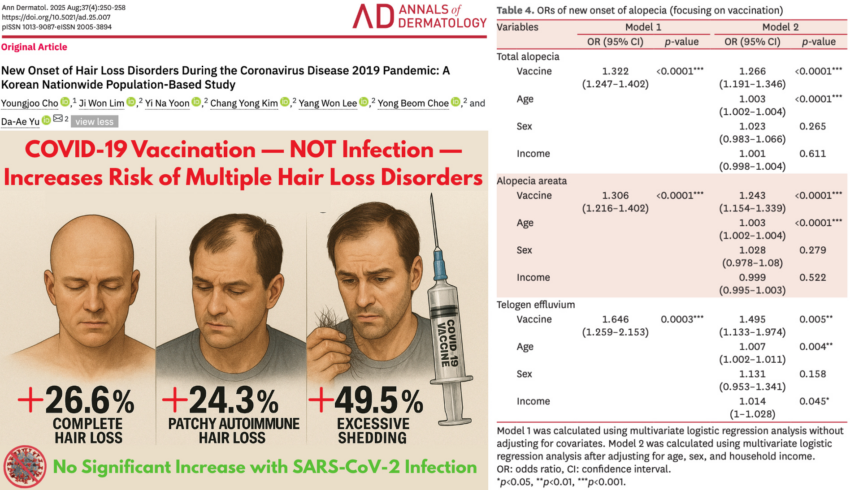A massive Korean nationwide study published in Annals of Dermatology has found that COVID-19 vaccination — but not COVID-19 infection — significantly increases the risk of hair loss disorders, including complete hair loss (alopecia totalis), patchy autoimmune hair loss (alopecia areata), and excessive shedding (telogen effluvium).
Using over 5.7 million individuals from the National Health Insurance Service database, researchers investigated the risks of new-onset alopecia during 2021, adjusting for demographics (age, sex, income) and comorbidities.
KEY FINDINGS
COVID-19 infection
-
Slightly increased risk of total alopecia (aOR 1.076) but not significant after statistical matching.
-
No significant association with alopecia areata or telogen effluvium.
COVID-19 vaccination
-
Alopecia totalis (complete hair loss): aOR 1.266 (26.6% increased odds, p<0.0001)
-
Alopecia areata (patchy autoimmune hair loss): aOR 1.243 (24.3% increased odds, p<0.0001)
-
Telogen effluvium (hair shedding): aOR 1.495 (49.5% increased odds, p=0.005)
-
Associations held true even after adjusting for infection status, comorbidities, and using matched datasets.
-
Androgenetic alopecia also increased (aOR 1.726) in vaccinated individuals in matched analysis.
Mechanistic hypotheses
-
Autoimmune triggers from spike protein immune responses.
-
Molecular mimicry between spike protein and human hair follicle components.
-
Systemic inflammatory and immune stress responses as possible telogen effluvium triggers.
This is the largest population-level evidence to date linking COVID-19 vaccination to increased risk of multiple hair loss disorders. This study corroborates Kim et al, who found among 1,748,136 Koreans that vaccinated individuals were 2.4 times more likely to develop hair loss than those who were not vaccinated:
Hair loss is something no one wants to experience — it can take a heavy emotional and psychological toll, affecting self-esteem, social confidence, and even mental health. While some forms such as telogen effluvium may be temporary, others like alopecia totalis can be long-lasting or permanent.
Epidemiologist and Foundation Administrator, McCullough Foundation
www.mcculloughfnd.org
Please consider following both the McCullough Foundation and my personal account on X (formerly Twitter) for further content.
Click this link for the original source of this article.
Author: Nicolas Hulscher, MPH
This content is courtesy of, and owned and copyrighted by, https://petermcculloughmd.substack.com and its author. This content is made available by use of the public RSS feed offered by the host site and is used for educational purposes only. If you are the author or represent the host site and would like this content removed now and in the future, please contact USSANews.com using the email address in the Contact page found in the website menu.







